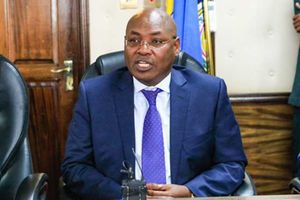Kenya faces child vaccines shortage over Sh2.8bn debt

Kenya is facing a looming shortage of life-saving childhood vaccines and other related commodities due to delayed government payments to global health financiers.
Kenya is facing a looming shortage of life-saving childhood vaccines and other related commodities due to delayed government payments to global health financiers, health experts have warned.
Other medicines and related commodities that will be affected are tuberculosis drugs, antiretrovirals (ARVs), HIV test kits, condoms, and essential laboratory reagents.
The crisis stems from the government's failure to meet its co-financing commitments to Gavi, the Vaccine Alliance, and the Global Fund.
Kenya is required to pay Sh2.8 billion by June 30, but while it is still three months away, experts warn further delay could mean the life-saving medicines being supplied much later after the current stocks have run out.
“Last year, Kenya experienced vaccine stock-outs primarily due to delays in disbursing the required Sh1.25 billion to Gavi. This year, the obligation has risen to Sh1.5 billion, and if the government does not act swiftly, we risk severe shortages,” said Dr Margaret Lubaale, Executive Director of the Health NGOs Network (HENNET), in an interview with Sunday Nation.
She explained that delays in payment could push Kenya to the back of the queue for vaccine shipments.
“When July 30 comes, countries that cleared their co-financing obligations as early as January will be prioritised for vaccine dispatch. If Kenya pays last, we’ll receive our consignment much later, yet children urgently need these vaccines,” she said, noting a global vaccine supply shortage.
Reverse progress
“If the government pays on the deadline—June 30—the earliest the shipment could arrive is late 2025, even as thousands of infants are born every day needing vaccinations.”
Kenya’s immunization programme is jointly funded through a co-financing agreement with GAVI, which supports low-income countries.
Vaccines such as BCG, polio, hepatitis B, DTP (diphtheria, tetanus, pertussis), and tetanus-diphtheria are fully financed by the government.
Others, including HPV, malaria and typhoid vaccines, are co-financed, while the rotavirus vaccine is fully funded by Gavi.
Dr Lubaale warned that unless consistent and timely payments are made, Kenya risks losing progress made in immunization.
“Kenya transitioned to a lower-middle-income country in 2014, and by 2029, Gavi will fully withdraw. If we’re not ready to self-finance immunization by then, millions could be at risk,” she said.
“If Kenya is locked out of the procurement process and isn’t prepared to self-finance, it will be catastrophic. If we begin losing children to preventable diseases like polio, it signals a failure of primary healthcare—and achieving Universal Health Coverage by 2030 will be out of reach.”
The Global Fund, which supports programmes targeting HIV, TB, and malaria, echoed the warning.
According to its official website, Kenya has so far contributed Sh1.7 billion ($13 million) to the Global Fund and pledged an additional Sh1.3 billion ($10 million) for the 2023–2025 cycle.
However, the funds remain unpaid.
Shipments and distribution by the Global Fund are contingent on countries honouring their co-financing agreements.
“This represents a 67 percent increase over its Sixth Replenishment pledge and demonstrates Kenya’s commitment to fighting the three diseases and building resilient health systems,” the Fund said.
In an email to Sunday Nation, senior Global Fund officials reminded Kenya of its obligations.
Infectious diseases
“It’s fundamental for Kenya to invest more in the fight against infectious diseases and in strengthening health systems. Kenya has fulfilled its co-financing commitments for previous grants. We continue to work with the government to ensure it remains on track,” the response read.
Outgoing Medical Services Principal Secretary Harry Kimtai, who oversees Kenya’s co-financing obligations with both Gavi and the Global Fund, early this month acknowledged the importance of donor funding.
He spoke during a recent high-level meeting on mitigation efforts amid a funding pause by USAID.
He warned of potential setbacks in HIV, TB, and malaria programme, as well as job losses among healthcare workers.
However, he said the government is engaging with partners to address the gaps and is exploring local solutions, including public-private partnerships and increased domestic resource mobilisation.
Health Cabinet Secretary Deborah Barasa said she was still consulting on the matter and promised a response soon.
"I am still consulting on this matter since PS Harry Kimtai who was the focal person handling our co-financing issues has been moved to another ministry. I will get back to you at a later date after I am done with consulting,” Dr Barasa told Nation on Saturday evening.





